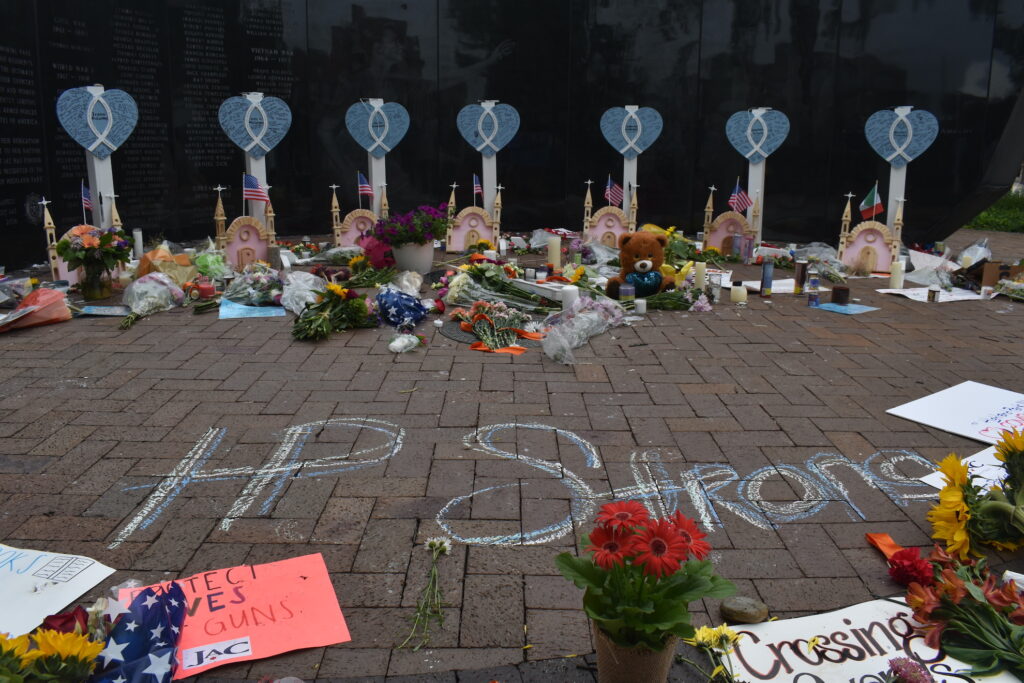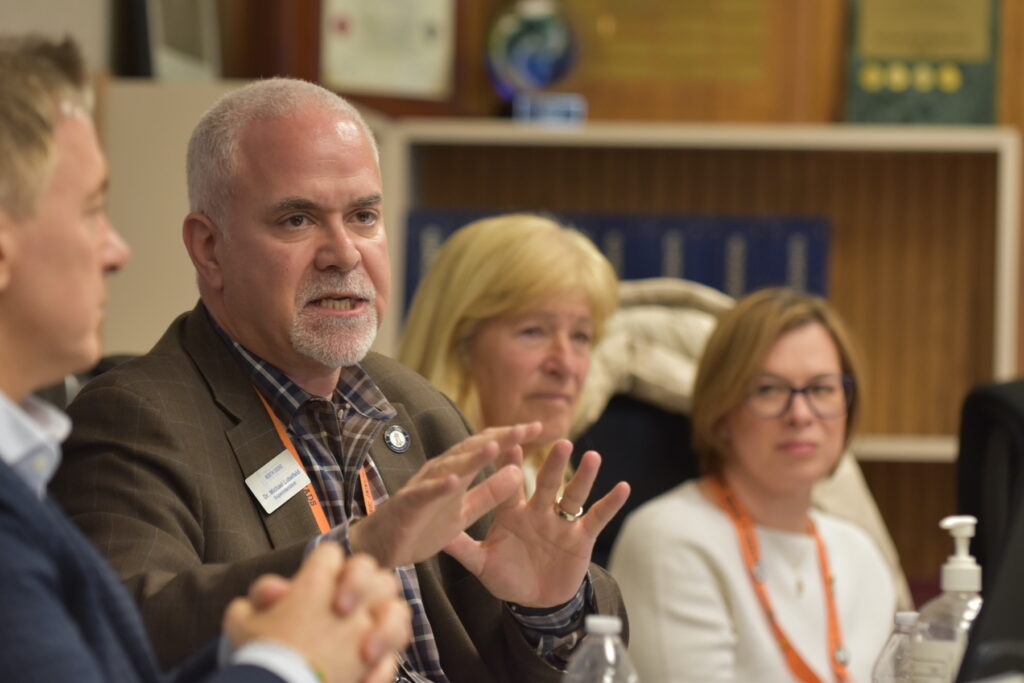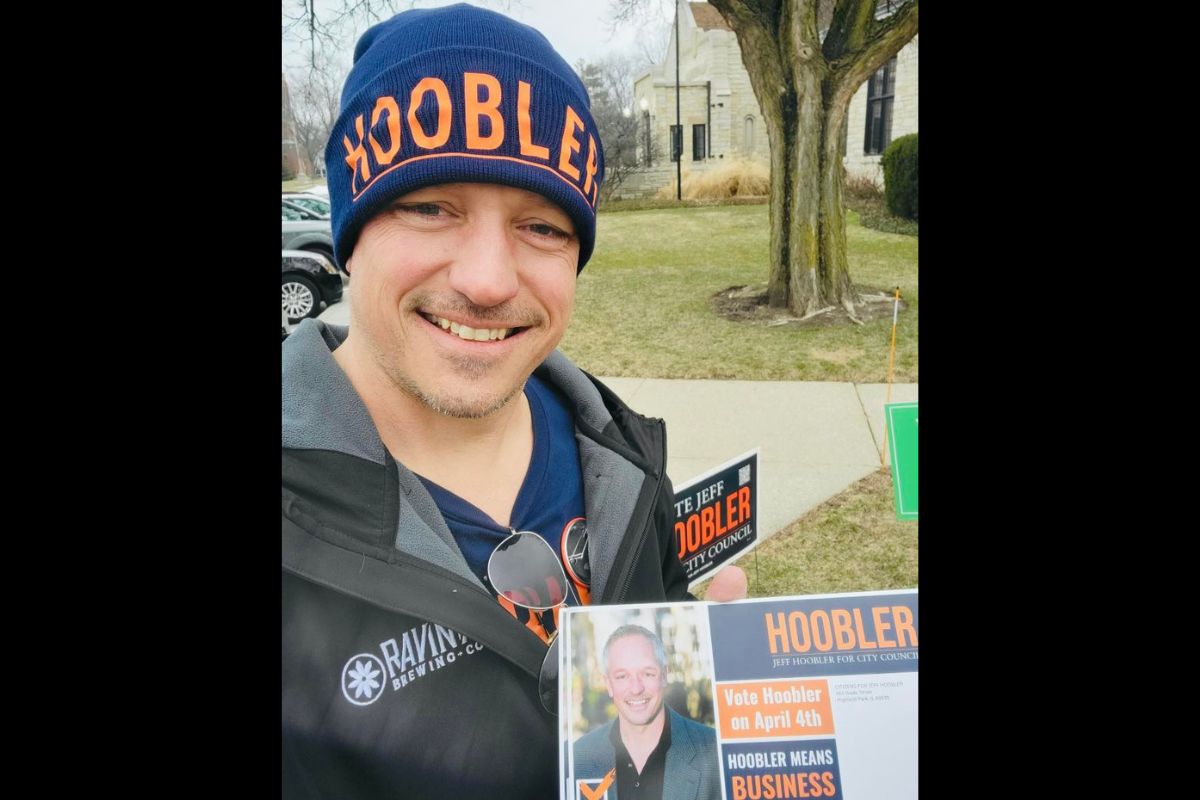
It’s Highland Park City Council or Ravinia Brewing for Jeff Hoobler — not both
Council votes against changing law that prohibits councilmembers from holding liquor licenses
The future of Jeff Hoobler’s status as a Highland Park councilmember — and the fate of his business’s liquor license — remain in question following a Monday council meeting when officials opted not to reverse a provision in the city’s liquor code that the recently elected official is currently in violation of.
A restriction in Highland Park’s municipal code prohibits an elected official from being issued a liquor license. A proposed motion from Councilmember Annette Lidawer to amend the law failed to obtain a majority of the council’s support on Monday, Feb. 12.
The council delivered a split 3-3 vote on the matter, thus striking down the amendment measure as it did not achieve the necessary four votes needed for approval. Mayor Nancy Rotering and Councilmembers Anthony Blumberg and Kim Stone were the dissenters while Lidawer, Yumi Ross and Andrés Tapia cast votes in support.
Hoobler, who is the well-known co-owner of Highland Park’s Ravinia Brewing Company, now faces what Lidawer described as a “Hobbesian choice” — a decision between his status on the council and the fate of his business’s liquor license.
Hoobler was elected to the City Council in 2023. He was the election’s top vote-getter among five candidates, collecting 2,355 votes, or 21.84%, with three seats available.
In a brief interview after the meeting’s conclusion, Hoobler told The Record that he has “not at this point” considered what his next step will be. He did, however, express disappointment with the decision of his peers.
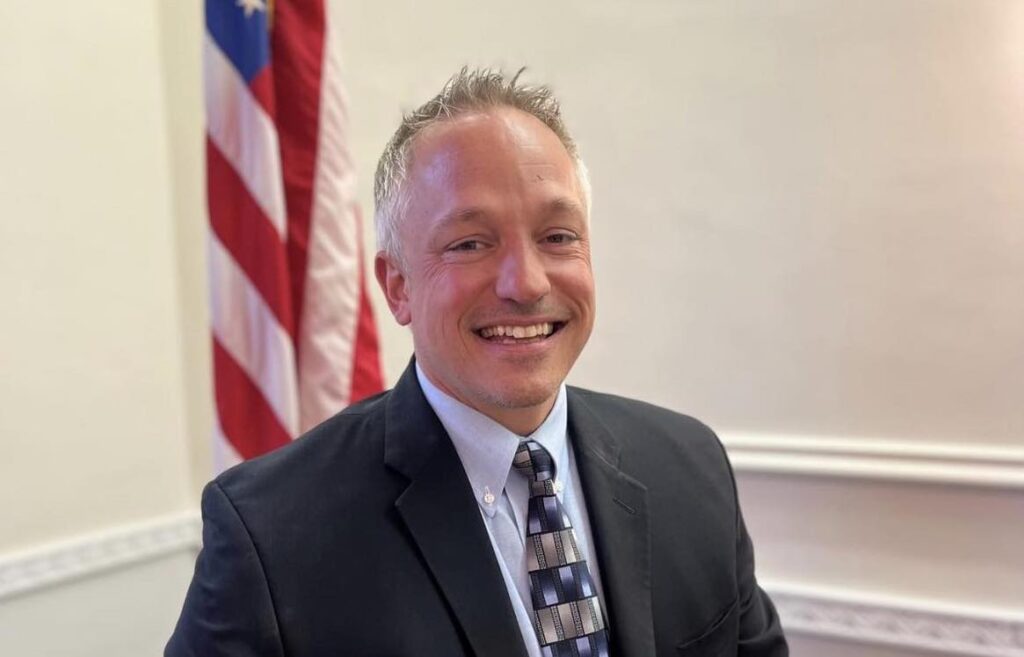
“With regards to the vote, I am disappointed that the mayor and the City Council members have chosen to play politics and divide our community under the guise of ethics,” Hoobler said. “Rather than trying to place blame and distract from the city’s mistakes, they should try to lead and focus on passing legislation for the betterment of the community.
“This shouldn’t have been about me,” Hoobler continued. “It should be about the fact that the city has a terrible code where the city is discriminating against restaurant owners like myself by treating us as second-class citizens incapable of serving as leaders in our community despite the fact that we serve our community every day of the year. Apparently many on the City Council and the mayor think people like myself are only capable of serving them their meals.”
City Manager Ghida Neukirch prefaced the board’s deliberations by offering background on how the issue has recently come to the forefront. Neukirch said a potential conflict was brought to her attention following the council’s last committee of the whole meeting in late January when officials discussed several proposed modifications to the city’s liquor code.
Hoobler, who is a liquor license holder through Ravinia Brewing, participated in those discussions and did not recuse himself from the meeting. Recusals commonly occur when an elected official believes they have a conflict of interest or lack impartiality in relation to a voting measure.
Hoobler did recuse himself from proceedings and discussions related to the liquor code during the Feb. 12 meeting.
Neukirch said that she then met with the city’s corporation counsel and asked for a thorough review of both the city’s local regulations and the state regulations. Legal representatives then “swiftly” told the city that Highland Park does have a restriction in its municipal code that prohibits an elected official from being issued a liquor license.
What’s up with this law?
The state of Illinois, in response to the end of prohibition, passed the Illinois Liquor Control Act of 1934, which still today remains as the state’s primary liquor law. When that law was enacted, the state included what officials described as a “general blanket prohibition” that included provisions restricting elected officials from holding liquor licenses.
The law has since been amended multiple times and the state has since declared that any municipality with a population of 55,000 people or fewer (Highland Park’s population is approximately 30,000 residents) has the green light to rescind the provision via a majority vote.
Highland Park reportedly has not previously considered rescinding the provision. While some of the city’s neighboring municipalities have amended the code, including Glenview, Highwood and Libertyville, many of its peers, including all of New Trier Township, have not repealed the provision.
Officials during the meeting stated that while Hoobler is not currently illegally serving on the City Council, he is improperly holding a liquor license under the city’s code.
Both applications for new liquor licenses and the renewal of licenses are administered administratively out of the city manager’s office, according to Neukirch. As part of that process, applications are asked a question if “an elected public official or law enforcement officer is directly or indirectly involved in the applicant’s business.”
Ravinia Brewing Company has filed for a liquor license in the city of Highland Park since 2015, Neukirch said and has listed the answer to that question as “no” on every one of its applications until its recent submission for renewal in 2024 when it provided a “yes” answer.
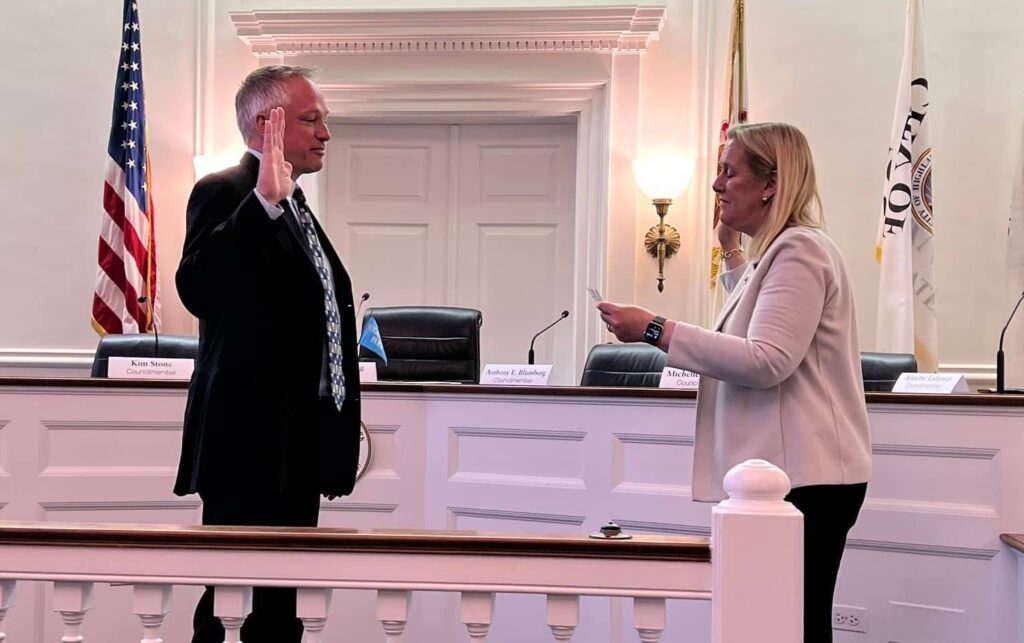
“That’s something that should have been flagged by us as staff, and candidly, it seemed from us, as a matter of disclosure,” Neukirch said, while noting that the city is taking future steps to include language from specific code provisions in future permit applications.
Hoobler told The Record that he was not aware of the city’s provision restricting the issuance of liquor licenses to elected officials.
“The lawyer for the city said he was not aware, and he’s been doing this for 40 years. And the staff of the city said they are not aware and they’ve been doing this for 30 years. So to try and place blame and put this under the guise of ethics is just a ridiculous statement by many City Council members,” he said.
Liquor licenses are also ultimately approved and signed by the liquor control commissioner, who in the case of Highland Park, is Rotering.
Rotering, who did note at the meeting “that a mistake was made” in the process of approving Ravinia Brewing’s liquor license, addressed the public early on in discussions, calling the issue at hand an “awful conversation.”
“I want to start by saying something really, really clear: Not a single one of us is happy to be in this situation. Not a single one of us,” Rotering said. “And tonight, we are faced with a decision that came about, frankly, and I am giving you this as context, because the city’s ethics guidelines were not being followed. Nobody went looking for this conflict.”
Rotering added that Hoobler has not recused himself from “any conversations related to (Highland Park’s) liquor control act. As a result of that, she said, questions were raised by “several people” concerning Hoobler’s participation in discussions and votes related to the liquor code and the potential conflict of interest by a sitting council member who owns a liquor manufacturing and distribution-related restaurant and business.
“It was clearly unintentional,” Rotering said. “I have no malice, or harm or desire to bring anybody down, but I have to say that this was raised by a number of people to our city manager and to our corporation counsel. … That’s how we got here (tonight).”
Split council
It became clear as soon as council members began sharing their views on the potential amendment that no firm consensus existed.
Supporters of the amendment argued, among other things, that the existing code law is “antiquated,” “outdated,” “dormant” and “archaic” while dissenters cited beliefs that the code serves its purpose in avoiding conflicts of interest.
Some members of the council also contested that they felt not moving forward with the amendment would place an unfair blame for the situation on just Hoobler.
“If anybody is accountable, it’s all of us, and not just one individual, particularly an individual with less experience who is learning his way and has been learning his way honorably,” Tapia said. “… Anybody who says they haven’t made a mistake in their service because of just finding their way would not be telling the truth.
“I think we need to be holding ourselves accountable. Mistakes were made by us, by the liquor commission chair, by staff, by legal counsel and by Jeff Hoobler. … I don’t see why he should pay the cost alone.”
Tapia later said, “rescinding (the provision) is the only logical, fairest and democratic choice in front of us.”
Similarly, Lidawer, who called her support of an amendment a “clear decision,” also brought up a point that the issue had not been previously addressed or flagged by anyone.
“Not one city staffer, elected official or legal counsel mentioned the issue or expressed any concerns about it,” she said. “Now, under this archaic law, the City Council may effectively force Councilmember Jeff Hoobler to resign by giving him a Hobbesian choice: choose your seat on the City Council or choose your livelihood.
“I will not be a part of a vote to keep a useless ordinance, which is not consistent with state law and which discriminates against people in certain vocations but not others from being able to hold office from no public policy and no compelling reasons.”
A core reason that Blumberg stated for his opposition was the argument that it is up to a candidate to know if they are qualified before vying for an elected office.
“When you run for office, it’s incumbent on each candidate, on each of us, to know the law at the time we are running and we put our name out there,” he said. “It’s not up to the clerk, it’s not up to the city staff and it’s not up to corporation counsel to confirm a candidate’s qualification for office.”
At one point in his comments explaining his decision, Blumberg compared the situation to the expulsion of former U.S. Rep. George Santos, who was expelled from the House of Representatives in late 2023 for fabricating key credentials and withholding a criminal history.
“That problem starts and ends with the candidate, and frankly, although it is a far more dramatic and flamboyant example, this is exactly what occurred with George Santos when he lied,” Blumberg said.
Before calling for a vote, Rotering, who cast the final “no vote,” said the board is “in pain over this situation.”
“(Jeff) is someone we have worked with and that we have respected and that we’ve appreciated and we appreciate that this is a horrible situation,” she said. “Could this situation be resolved by a change of the law? Sure. But if we respond to violations of the liquor law by changing the law, particularly for a sitting council member, then what is the point of having laws.”
Hoobler told The Record Monday night that he chose not to watch the live video of the meeting after recusing himself, thus declining to comment on any statements from the board.
“I will, of course, be watching that in the future and I imagine I will have many comments with respect to the turnout by the public both here tonight and via emails to the city council over the last few days. It’s clear what the will of the public is and I’m grateful beyond belief that I have the support of the public.”
Resident comments
Dozens of Highland Park residents packed council chambers Feb. 12 to highlight their support for Hoobler.
Eighteen members of the public addressed the board during the public-comment portion of the meeting, the majority of whom detailed a desire for the board to amend the city code.
Resident Linda Feinstein urged the board to fix what she called an “outdated law that doesn’t serve the public interest.”
“In effect, it’s like trying to do brain surgery with a grenade instead of a scalpel,” she said.
Feinstein also said that she believes the people of Highland Park have determined “this type of amendment would serve the public interest.”
“They voted to elect Jeff Hoobler to the City Council knowing that he had an interest in a business with a liquor license and if they felt that this was against the public interest, they would have not elected him,” she said. “In my view, there is no legitimate public policy goal served by preventing a restaurant owner with a liquor license from serving on the City Council.”
Jen Deutch, a Highland Park resident and alumna of Highland Park High School, emphasized her support of an amendment as well.
“I think it is what’s right for this community,” she said. “We are an amazing community. We’ve had great successes standing up for ourselves and overcoming very difficult moments and I think that it is this moment where we can continue to stand for what is right.”
Kris Walker, Hoobler’s co-owner at Ravinia Brewing Company, urged the board to not make its decision about politics.
“My ask of this committee is please don’t make this about politics,” he said. “Let’s please make this about business and doing the right thing. This is not an ethics issue. If Jeff made a mistake in not recusing him from something, then let him learn and he’ll do it right next time.”
The Record is a nonprofit, nonpartisan community newsroom that relies on reader support to fuel its independent local journalism.
Become a member of The Record to fund responsible news coverage for your community.
Already a member? You can make a tax-deductible donation at any time.

Martin Carlino
Martin Carlino is a co-founder and the senior editor who assigns and edits The Record stories, while also bylining articles every week. Martin is an experienced and award-winning education reporter who was the editor of The Northbrook Tower.

